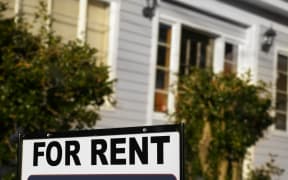Latest figures showing rising household incomes are hiding what some say is a growing disparity between the have and the have nots, particularly around homeownership.

A senior economist says the increasing gap in society will only fuel growing social problems. Photo: RNZ / Cole Eastham-Farrelly
All key income measures for household incomes increased prior to the Covid-19 lockdown.
In the year ended June 2020, average annual household disposable income increased 3.9 percent to nearly $87,000.
The latest data from Statistics New Zealand released on Monday was collected by interviewing people in their own home but this was cut short by the Covid-19 lockdown.
And while the increase in income is good news, not everyone is happy.
Otago University Māori Public Health senior lecturer Kiri Lawson-Te Aho said the figures are not broken down to show Māori, Pasifika or other ethnic groups.
She estimated their incomes were down about 19 percent compared with Pākehā.
"We know this measures households and doesn't include those who are homeless, doesn't include those who are living in funded accommodation like motels. Doesn't include those who are not homeowners. Not a particularly useful statistic."
She said Māori and Pacific people's severe housing deprivation prevalence rates are four to six times the European rates but the future levels of inequity are probably a lot greater.
Lawson-Te Aho said there were still no accurate figures available on the number of Māori, Pacific or other ethnic groups who were homeless.
"The rising rates of rents, of houses, are meaning increasingly more dire and severe situations and that impacts our children, it impacts our young people, it impacts our solo mothers, it impacts everyone."
Otago University housing and health research programme He Kainga Orana director professor Philippa Howden-Chapman said she saw the increase in household incomes as positive but was concerned about the widening divisions in society.

Philippa Howden-Chapman. Photo: Supplied
She said about 30 percent of people on low incomes were paying more than 40 percent of it on housing costs, compared to 3.2 percent in the highest income group.
"Not surprisingly renters who tend to be on lower incomes were more than twice as likely as homeowners to be spending 40 percent or more on housing costs, so they are the big divisions in society that we see again."
She said income increases, including government benefits were not keeping up with the increase in rents, making it harder for those renting to buy a house.
Infometrics senior economist Brad Olsen said the increasing gap in society would only fuel growing social problems.
"That has obvious ramifications for the economy. If people are spending so much money on housing that leaves less cash left over for other options, for other spending, for other parts of the economy to keep the momentum up and it also means people could well be more stressed, less productive at work, all of those sorts of challenges."
The latest figures from the Real Estate Institute for January show an increase in houses on the market, with the national median price now at $730,000.
Olsen said growth in house prices meant buyers were having to spend more but it came with a warning.
"When you go to the bank you are having to get out a lot of money for probably a $1 million house just about in a fair few places across the country and so that means you are having to pay off a much, much larger loan even though those interest repayments are cheaper."
Olsen warned interest rates would eventually rise and he predicted it happening in 2023/24.
"The challenge is when you get out a mortgage that is a 30-year period often and so for people who might be leveraging themselves up to the eyeballs to get into the housing market it may be affordable at this rate for them to pay off that mortgage. Does that continue into the future? I think [it] is going to be one of the concerns for households that have a very high debt loading."







